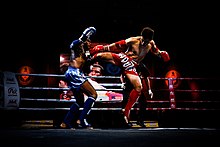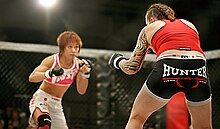Portal:Martial arts
The Martial Arts Portal

Martial arts are codified systems and traditions of combat practiced for a number of reasons such as self-defence; military and law enforcement applications; competition; physical, mental, and spiritual development; entertainment; and the preservation of a nation's intangible cultural heritage. (Full article...)
Although the earliest evidence of martial arts goes back millennia, the true roots are difficult to reconstruct. Inherent patterns of human aggression which inspire practice of mock combat (in particular wrestling) and optimization of serious close combat as cultural universals are doubtlessly inherited from the pre-human stage and were made into an "art" from the earliest emergence of that concept. Indeed, many universals of martial art are fixed by the specifics of human physiology and not dependent on a specific tradition or era.
Specific martial traditions become identifiable in Classical Antiquity, with disciplines such as shuai jiao, Greek wrestling or those described in the Indian epics or the Spring and Autumn Annals of China. (Full article...)
Selected articles
Selected biography
With the publishing of Yue Fei's 17th folklore biography, The Story of Yue Fei (1684), a new, fictional Zhou Tong emerged, who differed greatly from his historical persona. Not only was he now from Shaanxi, but he was Yue's adopted father, a learned scholar with knowledge of the eighteen weapons of war, and his personal name was spelled with a different, yet related, Chinese character. The novel's author portrayed him as an elderly widower and military arts tutor who counted Lin Chong and Lu Junyi, two of the fictional 108 outlaws on which the Water Margin is based, among his former pupils. A later republican era folktale by noted Yangzhou storyteller Wang Shaotang not only adds Wu Song to this list, but represents Zhou as a knight-errant with supreme swordsmanship. The tale also gives him the nickname "Iron Arm", which he shares with the executioner-turned-outlaw Cai Fu, and makes the outlaw Lu Zhishen his sworn brother. Because of his association with the outlaws, he is often confused with the similarly named outlaw Zhou Tong. (Full article...)
Selected entertainment
13 Assassins (Japanese: 十三人の刺客, Hepburn: Jūsannin no Shikaku) is a 2010 samurai film directed by Takashi Miike, and starring Koji Yakusho, Takayuki Yamada, Sōsuke Takaoka, Hiroki Matsukata, Kazuki Namioka and Gorō Inagaki. A remake of Eiichi Kudo's 1963 Japanese period drama film 13 Assassins, it is set in 1844 toward the end of the Edo period in which a group of thirteen assassins—comprising twelve samurai and a hunter—secretly plot to assassinate Lord Matsudaira Naritsugu, the murderous leader of the Akashi clan, to thwart his appointment to the powerful Shogunate Council.
The film marks the third collaboration in which Yamada and Takaoka co-starred, the first two being Crows Zero and Crows Zero 2, both directed by Miike. Principal photography took place over two months, from July to September 2009, in Tsuruoka, Yamagata, in northern Japan. The film opened in Japan on 25 September 2010 and in the United States on 29 April 2011. It received critical acclaim from western critics, who compared it favourably to Akira Kurosawa's oeuvre.
Sports portals
Selected image
 |
Fencing is a combat sport that features sword fighting. The three disciplines of modern fencing are the foil, the épée, and the sabre (also saber); each discipline uses a different kind of blade, which shares the same name, and employs its own rules. Most competitive fencers specialise in one discipline. The modern sport gained prominence near the end of the 19th century and is based on the traditional skill set of swordsmanship. The Italian school altered the historical European martial art of classical fencing, and the French school later refined that system. Scoring points in a fencing competition is done by making contact with an opponent. (Full article...)
General images -
Selected quote
Topics
- Regional origin - China - Europe - India - Indonesia - Japan - Korea - Philippines
- Unarmed techniques - Chokehold - Clinch - Footwork - Elbow strike - Headbutt - Hold - Kick - Knee strike - Joint lock - Punch - Sweep - Takedown - Throw
- Weapons - Archery - Duel - Knife fighting - Melee weapons - Shooting - Stick-fighting - Swordsmanship
- Training - Kata - Practice weapon - Punching bag - Pushing hands - Randori - Sparring
- Striking - Boxing - Capoeira - Karate - Kickboxing - Muay Thai - Lethwei - Sanshou - Savate - Taekwondo - Vovinam
- Internal - Aikido - Aikijutsu - Baguazhang - Tai chi - Xing Yi Quan
- Full contact / Combat sports - Professional boxing - Professional kickboxing - Knockdown karate - Mixed martial arts - Pankration - Submission wrestling
- Self-defense / Combatives - Arnis - Bartitsu - Hapkido - Kajukenbo - Krav Maga - MCMAP - Pencak Silat - Systema - Wing Chun - Legal aspects
- Eclectic / Hybrids - American Kenpo - Chun Kuk Do - Jeet Kune Do - Shooto - Shorinji Kempo - Unifight
Categories
Things you can do
See the list on the right of Martial art related projects who organise work on these articles. You can also add your self to the list of Wikipedians by martial art
Talk page tagging
If you come across a martial arts related article, adding the project template {{WikiProject Martial arts}} to the talk page will help identify them for improvement and linking to related articles. For Boxing, Fencing, Mixed martial arts and Sumo. Use {{WikiProject Boxing}}, {{WikiProject Fencing}}, {{WikiProject Mixed martial arts}} and {{WikiProject Sumo}} respectively.
- Assessment
- If possible please assess articles you tag using guidelines (Boxing, Mixed martial arts and Sumo).
Deletions
Monitor and contribute to deletion debates (Boxing).
Find images
Wikipedia requested images of martial artists, mixed martial artists and boxers.
Associated Wikimedia
The following Wikimedia Foundation sister projects provide more on this subject:
-
Commons
Free media repository -
Wikibooks
Free textbooks and manuals -
Wikidata
Free knowledge base -
Wikinews
Free-content news -
Wikiquote
Collection of quotations -
Wikisource
Free-content library -
Wikiversity
Free learning tools -
Wikivoyage
Free travel guide -
Wiktionary
Dictionary and thesaurus























































































